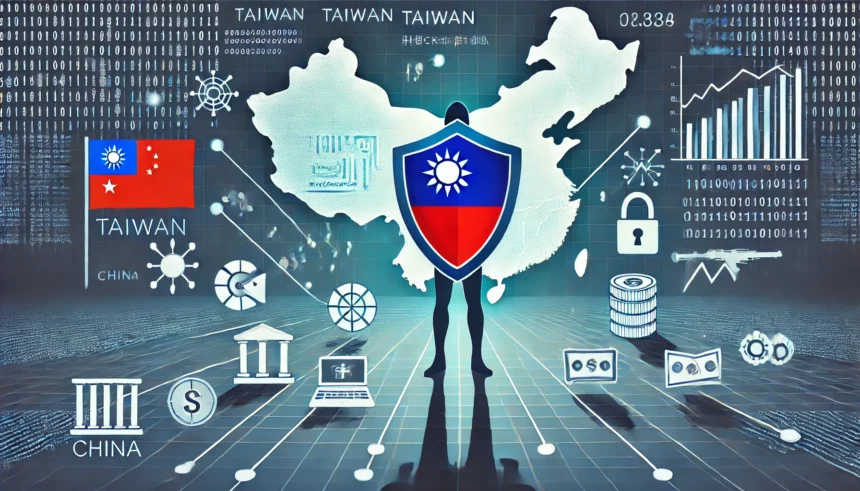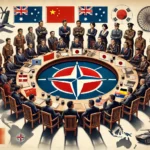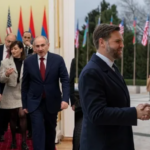Summary by Geopolist | Istanbul Center for Geopolitics:
Recently, Taiwan has emerged as a central subject in numerous wargames organized by entities from Capitol Hill to Wall Street. These exercises generally replicate possible military operations by China aimed at unifying Taiwan, a territory that Beijing asserts as its own. Scenarios encompass naval blockades and amphibious invasions, focusing on the defensive responses of Taiwan, the United States, and their allies. Recent developments have underscored a new aspect: China’s employment of economic and cyber-coercion strategies to undermine Taiwan without engaging in direct military conflict.
The Emphasis on Non-Military Coercion
A recent tabletop exercise organized by the Foundation for Defense of Democracies (FDD) in partnership with the Taiwan Academy of Banking and Finance (TABF) emphasized non-military strategies. The simulation was designed to investigate the economic and cyber strategies that Beijing might utilize to destabilize Taiwan and encourage unification. These strategies may undermine Taiwan’s political and economic stability without provoking a global military reaction.
Simulated Key Scenarios: Economic and Financial Warfare.
In the initial scenario, Beijing imposed tariffs on significant Taiwanese imports, alongside disinformation campaigns and cyber-attacks aimed at Taiwan’s financial sector. This campaign sought to induce instability, resulting in bank runs and fluctuations in the stock market.
Cyberattacks targeting essential infrastructure:
The second scenario involved a swift escalation of Chinese cyber-attacks targeting Taiwan’s banking network and electric grid, resulting in extensive power outages. The employment of civilian vessels to disrupt undersea internet cables further isolated Taiwan from the global community.
Incursions and maritime blockades are significant military strategies employed to exert control over territorial waters and restrict access to specific regions. These tactics can have profound implications for international relations and regional stability.
The third scenario simulated more assertive actions, including incursions by Chinese coast guard and law enforcement vessels into Taiwanese waters, thereby escalating tensions.
Extended Military Drills:
The final scenario envisioned a 90-day Chinese military exercise that effectively blockaded Taiwan, thereby disrupting trade and assessing the island’s resilience under sustained pressure.
Strategic Implications: The scenarios indicate that Beijing may utilize a combination of economic pressure and gray-zone tactics—non-military aggressive actions—to modify Taiwan’s political landscape, potentially affecting its elections or public sentiment regarding unification. During election cycles, Beijing may intensify actions aimed at undermining Taiwan’s ruling party while supporting candidates more amenable to reunification.
Suggestions for Taiwan:
The report from FDD and TABF highlighted the necessity for Taiwan to enhance its economic and cyber defenses to address these risks effectively. Essential recommendations comprise:
- Repatriation of Financial Capital:
Taiwanese financial institutions ought to extract substantial capital from Hong Kong and China to mitigate Beijing’s influence.
- Creating a Secondary Stock Exchange:
Taiwan ought to establish a mirror stock exchange in the United States to protect its domestic financial system from cyber-attacks.
- Enhancing the resilience of the financial sector.
Taiwan’s financial institutions ought to conduct stress tests on their operations to ensure resilience against abrupt Chinese restrictions.
Improving Cybersecurity:
Taiwan ought to allocate resources towards safeguarding critical infrastructure and enhancing its offensive cyber capabilities, drawing insights from Russia’s conduct in Ukraine.
Energy security and defense: Taiwan’s dependence on imported energy, especially liquefied natural gas (LNG), constitutes a significant vulnerability. The report indicates:
Reevaluating Taiwan’s nuclear energy policy to mitigate dependency.
Increasing the capacity for LNG storage.
Enhancing the advancement of distributed solar energy through the integration of energy storage systems.
Global Assistance and Collaboration:
The simulation suggested that the United States enhance its support for Taiwan by facilitating an emergency currency swap agreement to stabilize the New Taiwan Dollar in times of crisis. Washington should advocate for Taiwan’s participation in international organizations, including the International Monetary Fund (IMF), to enhance economic stability.
Broader Strategic Takeaways: The exercise underscored that, contrary to traditional wargame assumptions centered on military conflicts, a military invasion may not represent China’s initial strategy. The focus on economic and cyber-coercion illustrates Beijing’s strategy of employing “peaceful” methods to attain unification while avoiding the onset of a full-scale war. This strategy corresponds with Chinese President Xi Jinping’s discourse on “peaceful reunification,” potentially seeking to systematically weaken Taiwan’s defenses.
Practical Illustrations and Contemporary Significance:
The scenarios presented in the exercise are not entirely hypothetical. Comparable gray-zone strategies have been observed, exemplified by incidents where Chinese vessels disrupted internet cables to Taiwan’s Matsu Islands, resulting in outages. During former U.S. House Speaker Nancy Pelosi’s visit to Taiwan in 2022, Taiwanese government websites were subjected to cyber-attacks attributed to Chinese and Russian sources.
These developments highlight that Taiwan’s vulnerabilities are not limited to conventional military threats, but also include financial stability, critical infrastructure security, and the manipulation of public opinion. Addressing these deficiencies will be essential for Taipei as cross-strait tensions persist.







